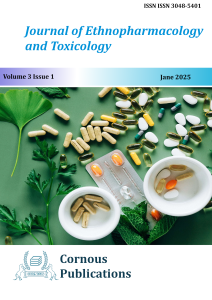
Journal of Ethnopharmacology and Toxicology
Peer Reviewed Open Access Journal
ISSN: 3048-5401
Submit Manuscript
Peer Reviewed Open Access Journal
ISSN: 3048-5401
Submit ManuscriptIn Nigeria, numerous organic wastes from the processing of Prosopis africana are indiscriminately discarded and this has led to environmental pollution. This study compared the phytochemical, mineral and proximate constituents of epicarp, mesocarp and seeds of P. africana. Plant samples were collected from P. africana sellers in Ogodo, Ankpa Kogi State. The collected samples were dried at room temperature for 21 days and were grounded to a powdered form. Phytochemical, proximate and mineral analyses were carried out using standard methods of AOAC (2020). Data was analysed by One-way Analysis of Variance (ANOVA) at 95% confidence limits upper confidence limit and lower confidence limit using the SPSS, IBM Statistics version 21.0 software. Differences between groups were considered to be statistically significant at p≤0.05. Results revealed the epicarp, mesocarp and seeds of P. africana as a rich source of protein, carbohydrate and fibre and also contained considerable amounts of phytochemicals such as alkaloid, flavonoid, saponins, tannin and phenols. It also contained good composition of macro and micro elements like calcium, phosphorus, sodium, potassium, magnesium, zinc and iron. The seeds and epicarp contained a high nutritional and phytochemical composition compared to the mesocarp. The epicarp and mesocarp could be explored pharmacologically for their therapeutic values instead of being disposed.
phytochemical, mineral, proximate, Prosopis africana
Adeiza, Z. D., Boniface, M. T., Ali, B. A., Eneye, B. K., Olorunmowaju, I. A., & Danjuma, S. Y. (2023). Neem (Oil) and Crop Defence: A Desire for the Future. Journal of Food Technology Processing, 5(3), 148.
Aduwamai, H. U., Oluwatosin, O. J., Malgwi, M. J., & Umaru, I. K. (2024). Anti-inflammatory and anti-microbial effects of Prosopis africana methanol stem back extract. African Journal of Biochemistry and Molecular Biology Research, 1, 837-849.
Agubosi, O. C. P., Imudia, F. D., & Alagbe, J. O. (2022). Evaluation of the nutritional value of air dried and sun-dried sweet potato (Ipomoea batatas) peels. European Journal of Life Safety and Stability, 14(22), 43-51.
Akpata, E. I., Ani, O. N., & Nwodo, O. F. C. (2023). Phytonutrients and anti-nutrient composition of aqueous extract of fermented seeds of Prosopis africana. Asian Journal of Research in Biochemistry, 13(3), 12-27.
Alagbe, J. O. (2022). Prosopis africana (African mesquite) oil as an alternative to antibiotic feed additives on broiler chickens’ diets: Haematology and serum biochemical indices. Central Asian Journal of Theoretical and Applied Sciences, 3(2), 19-29.
Alagbe, J. O. (2022). Prosopis africana (African mesquite) oil as an alternative to antibiotic feed additives on broiler chickens’ diets: Performance and nutrient retention. Discovery, 58(314), 134-142.
Alagbe, J. O. (2023). Bioactive compounds of Prosopis africana oil (African mesquite) using gas chromatography and mass spectrometry (GC-MS) technique. Brazilian Journal of Science, 2(8), 79-87.
Alagbe, J. O., Agubosi, P. C. O., & Oluwafemi, A. R. (2023). Histopathology of broiler chickens fed diets supplemented with Prosopis africana (African mesquite) essential oil. Brazilian Journal of Science, 2(9), 49-59.
Anaduaka, E. G., Uchendu, N. O., Osuji, D. O., Ene, L. N., & Amoke, O. P. (2022). Nutritional compositions of two edible insects: Oryctes rhinoceros larva and Zonocerus variegatus. Heliyon, 7(3), e09144.
Eschen, R., Bekele, K., Jumanne, Y., Kibet, S., Makale, F., Mbwambo, R. J., Megersa, B., Mijay, M., Moyo, F., Munishi, L., Mwihomeke, M., Nunda, W., Nyangito, M., Witt, A., & Schaffner, U. (2023). Experimental Prosopis management practices and grassland restoration in three Eastern African countries. CABI Agriculture and Bioscience, 4, 21.
Fasoyiro, S. B., Ajibade, S. R., Omole, A. J., Adeniyan, O. N., & Farinde, E. O. (2023). Proximate, minerals and anti-nutritional factors of some underutilized grain legumes in southern-western Nigeria. Journal of Nutrition and Food Science, 36(1), 18-23.
Gangbe, M., Kpatinvoh, B., Attrevy, B., Allagbe, A., & Degnon, R. (2022). Literature review on Prosopis africana and the use of essential oils as preservatives. IOSR Journal of Environmental Science, Toxicology and Food Technology, 15(10), 27-34.
John, A. O. (2024). Prosopis africana extracts as potential natural alternatives to synthetic antibiotics and key for sustainable broiler production: A review. Bioequivalence and Bioavailability International Journal, 8(1), 20-27.
Kolapo, A. L., Okunade, M. B., Adejumobi, J. A., & Ogundiya, M. O. (2023). Phytochemical composition and antimicrobial activity of Prosopis africana against some selected oral pathogens. World Journal of Agricultural Science, 5, 90–93.
Lalitha, T., Vishwanatha, S., & Venkataraman, L. (2022). Oral toxicity of Madhuca butyracea mach. saponins to albino rats. Indian Journal of Experimental Biology, 28, 642-646.
Momoh, T. B., Appah, J., Onwumere, G. B., & Dan, V. M. Y. (2024). Assessment of phytochemical, mineral and proximate contents of African black night shade (Solanum nigrum) used for bone fracture treatment by traditional bone healers in Ogodo, Ankpa Kogi State, Nigeria. Journal of Applied Science and Environmental Management, 28(11), 3917-3922.
Okafor, O. E., Ezeanyika, L. U. S., & Ujonwundu, C. U. O. (2023). Effect of traditional processing techniques on the proximate and mineral compositions of jack fruit (Artocarpus heterophyllus) seeds. International Conference on Food Nutrition, Chemical and Environment Engineering, 1, 1-4.
Orish, E. O., Ikpeama, U. E., Orish, N. C., Ezejiofor, N. A., Okolo, O. K., Cirovic, A., Cirovic, A., Nwaogazie, I. L., & Onoyima, S. C. (2024). Prosopis africana exerts neuroprotective activity against quaternary metal mixture-induced memory impairment mediated by oxidoinflammatory response via Nrf2 pathway. Neuroscience, 11(2), 118–143.
